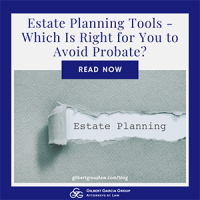Estate Planning Tools – Which Is Right For You To Avoid Probate?

There are many estate planning tools- Wills, Trusts, Enhanced Life Estate Deeds, Beneficiary Designations via certain accounts, Letters of Instructions, among others.
Certain estate planning tools allow you to avoid a Probate action. Probate refers to the court process associated with the distribution of a Deceased’s property. Such process can be time-consuming and relatively costly. Continue reading to see what options may be available to you.
Wills vs. Trusts
Wills and Trusts are the two most common utilized estate planning tools. Both tools address how property is to be distributed and what wishes are to be considered upon your death. However, one of the main differences to consider is that a Will is generally subject to Probate- the Court interprets the Will and how property is to be distributed. There are certain circumstances where a Will may not necessarily be subject to Probate, such circumstances will include the use of other estate planning tools, such as:
Trusts, Enhanced Life Estate Deeds, and Beneficiary Designations on accounts.
Unlike Wills, Trusts are treated as legal entities and generally avoid the Probate Process. Trusts usually do not just address how property is to be distributed, but how it is to be managed. There are several advantages to having a Trust and usually vary according to the type of Trust. There are several types of Trusts: Revocable Living Trusts, Irrevocable Trusts, Land Trusts, Business Trusts, among others. Before determining which Trust is the best fit for you, if any, you should consider the assistance of an estate planning attorney and tax professional to discuss the advantages, regulations, considerations, and potential implications.
For most comprehensive estate plans, it is very common to have both a Trust and a Will. Both estate planning tools can assist with specifically allocating your wishes in regard to the distribution of property.
Enhanced Life Estate Deeds
An Enhanced Life Estate Deed is a legal instrument that allows you to own the property as a Life Tenant (while you are alive), and upon your death, transfers ownership to your designated beneficiaries (remainderman). This is done automatically, avoiding Probate and the burden of exploiting financial resources, time, and other potential challenges a Probate action could entail. A certified short form death certificate (without cause of death) will need to be recorded along with a cover letter indicating the legal description of the property. After the recording of the cover letter and certified short form death certificate, the remainderman will automatically be granted title to the property.
Beneficiary Designations
Beneficiary Designations, including payable on death options, allow you to transfer assets directly to individuals (usually overruling any wishes the Will states). Such designations are frequently made on bank accounts, retirement accounts, and insurance policies. You’ll have to contact the appropriate institutions to ensure such designations are in place and in conformance with your wishes.
It is important to have an experienced estate planning professional evaluate your specific estate planning profile, your goals, and determine what estate planning tool is the most suitable for your needs. Let Gilbert Garcia Group, P.A. provide you with a complimentary consultation and assist you with your estate planning. Contact us today to schedule your free consultation.

